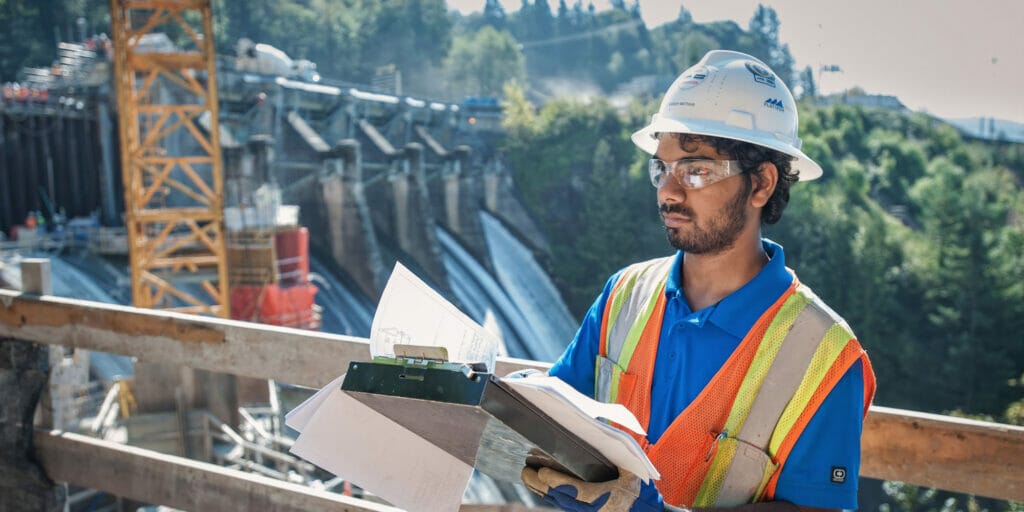The world of construction is incredibly diverse, involving a tapestry of professionals who work hand-in-hand to transform blueprints into towering infrastructures. Among these professionals, engineers play a critical role in the construction process. From planning to execution, engineers work tirelessly to ensure the effective and efficient realization of architectural visions. Let’s embark on a journey to explore the 7 main types of engineers in construction.
Understanding the Landscape: Types of Engineering in Construction
Just as in any field, construction engineering hosts a variety of specialties, each with its own unique responsibilities and challenges. The types of engineering found within this sector vary greatly, but here we will delve into the 7 types most commonly encountered on a construction site.

1. Construction Engineer
The construction engineer is arguably the cornerstone of any construction project. These engineers plan, manage, and supervise the construction of buildings, roads, bridges, and other structures. Typically, they work on-site to oversee the practical aspects of construction, ensuring that the project adheres to the design, budget, and schedule.
2. Civil Engineer
Civil engineering is an umbrella term that includes construction engineering and several other specializations. Civil engineers work in the planning, design, construction, and maintenance of large infrastructure projects, such as highways, railroads, bridges, tunnels, dams, and airports. Often, they serve as a crucial link between the project design team and the execution team, translating design concepts into on-site realities.
3. Structural Engineer
Within the realm of civil engineering, structural engineers specialize in understanding, predicting, and calculating the stability, strength, rigidity, and aging of structures. These professionals are called upon to design the structural engineering elements of buildings and bridges, ensuring that they can withstand all types of forces and loads.
4. Geotechnical Engineer
Geotechnical engineers provide invaluable insights into the earth materials a construction project is based upon. Their analyses of soil, rock, and groundwater conditions can profoundly impact the design and construction process, helping to preemptively address potential issues like landslides, soil liquefaction, and foundation failures.
5. Environmental Engineer
Environmental engineers apply the principles of engineering, soil science, biology, and chemistry to develop solutions to environmental problems. They are involved in efforts to improve recycling, waste disposal, water and air pollution control, and even public health issues. In the construction industry, they ensure projects comply with environmental regulations and promote sustainable practices.
6. Transportation Engineer
Transportation engineers focus on the design, construction, and maintenance of transport systems to enable safe, efficient, and convenient movement of people and goods. They are involved in projects like road networks, airport runways, and transit systems, making them integral to construction projects aimed at enhancing connectivity.
7. Surveying Engineer
Surveying engineers play a crucial role at the beginning of any construction project. They measure and map the environment using specialized technology, providing precise information about the size, shape, and contour of the construction site. This data aids in planning and designing the project.
The Intersection of Roles: Construction Engineering and Management
The successful realization of a construction project requires not only the diverse expertise of the above engineers but also proficient management. This is where the role of a construction manager comes into play. Often equipped with a background in engineering, a construction manager coordinates and supervises the construction process from the conceptual development stage through final construction. Their responsibilities can include estimating project costs, scheduling the work, coordinating with subcontractors, ensuring that safety codes are met, and dealing with any issues that may arise during the construction. These professionals are essential to ensuring that engineers’ work is synchronized, resources are managed efficiently, and the project stays on track and within budget. The combination of their managerial prowess with the technical expertise of engineers creates a harmonious blend of construction management.

A Promising Path: The Career in Construction Engineering
Those who choose a career in construction engineering embark on a challenging yet rewarding path. Members of the American Society of Civil Engineers, for example, can attest to the satisfaction of seeing their work contribute to the growth and development of communities. It’s an industry where every project brings new learnings, new challenges, and new opportunities to leave a lasting impact on the landscape of our society. The breadth of roles available also provides room for professionals to find their niche, be it in a more hands-on technical role like a construction engineer, or a more strategic, oversight-focused position like a construction manager. The work of engineers in construction is multifaceted and vital. Without their diverse expertise and abilities, the skylines we so often admire would be little more than dreams on paper. These professionals bring our world to life, one construction project at a time.

Concluding Thoughts: The Power of Engineering in Construction
The engineering sector in construction, with its diverse types and roles, serves as the backbone of our built environment. From concept to completion, engineers work diligently, their expertise and skills converging to bring architectural visions to life. Whether they are civil engineers planning infrastructure, construction engineers managing the build, or construction managers ensuring smooth project execution, their contributions are undeniably crucial. With a multitude of specialties ranging from environmental to geotechnical engineering, the construction industry presents an array of career opportunities. It is a dynamic field that welcomes those with a passion for problem-solving and a desire to shape the world around them. It is important to remember that engineering in construction is not just about erecting buildings; it’s about creating sustainable, safe, and efficient spaces where people live, work, and connect. In an age where we are constantly reminded of the delicate balance between development and sustainability, engineers stand on the front line, their work serving as a testament to human ingenuity and resilience.




